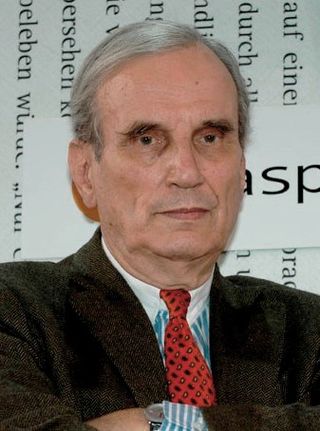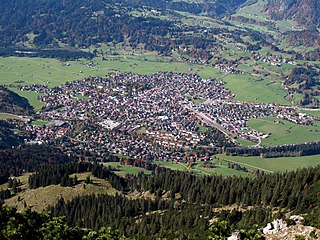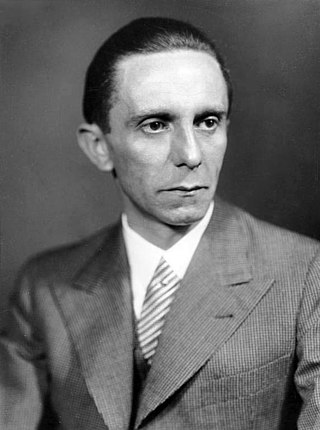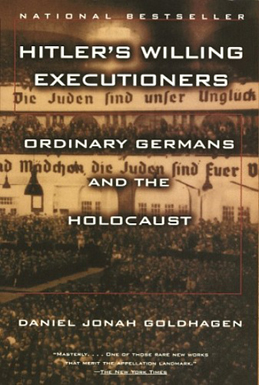Related Research Articles

The Nazi Party, officially the National Socialist German Workers' Party, was a far-right political party in Germany active between 1920 and 1945 that created and supported the ideology of Nazism. Its precursor, the German Workers' Party, existed from 1919 to 1920. The Nazi Party emerged from the extremist German nationalist, racist and populist Freikorps paramilitary culture, which fought against communist uprisings in post–World War I Germany. The party was created to draw workers away from communism and into völkisch nationalism. Initially, Nazi political strategy focused on anti–big business, anti-bourgeois, and anti-capitalist rhetoric; it was later downplayed to gain the support of business leaders. By the 1930s, the party's main focus shifted to antisemitic and anti-Marxist themes. The party had little popular support until the Great Depression, when worsening living standards and widespread unemployment drove Germans into political extremism.

Joachim Clemens Fest was a German historian, journalist, critic and editor who was best known for his writings and public commentary on Nazi Germany, including a biography of Adolf Hitler and books about Albert Speer and German resistance to Nazism. He was a leading figure in the debate among German historians about the Nazi era. In recent years his writings have earned both praise and strong criticism.

Daniel Jonah Goldhagen is an American author, and former associate professor of government and social studies at Harvard University. Goldhagen reached international attention and broad criticism as the author of two books about the Holocaust: Hitler's Willing Executioners (1996), and A Moral Reckoning (2002). He is also the author of Worse Than War (2009), which examines the phenomenon of genocide, and The Devil That Never Dies (2013), in which he traces a worldwide rise in virulent antisemitism.

Sir Ian Kershaw is an English historian whose work has chiefly focused on the social history of 20th-century Germany. He is regarded by many as one of the world's experts on Adolf Hitler and Nazi Germany, and is particularly noted for his biographies of Hitler.
Timothy Wright Mason was an English Marxist historian of Nazi Germany. He was one of the founders of the History Workshop Journal and specialised in the social history of the Third Reich. He argued for the "primacy of politics," i.e., that the Nazi government was "increasingly independent of the influence of the [German] economic ruling classes," and believed the Second World War had been triggered by an economic crisis inside Germany.

Hans Mommsen was a German historian, known for his studies in German social history, for his functionalist interpretation of the Third Reich, and especially for arguing that Adolf Hitler was a weak dictator. Descended from Nobel Prize-winning historian Theodor Mommsen, he was a member of the Social Democratic Party of Germany.

Sir Richard John Evans is a British historian of 19th- and 20th-century Europe with a focus on Germany. He is the author of eighteen books, including his three-volume The Third Reich Trilogy (2003–2008). Evans was Regius Professor of History at the University of Cambridge from 2008 until his retirement in 2014, and President of Cambridge's Wolfson College from 2010 to 2017. He has been Provost of Gresham College in London since 2014. Evans was appointed Knight Bachelor for services to scholarship in the 2012 Birthday Honours.
Henry Ashby Turner, Jr. was an American historian of Germany who was a professor at Yale University for over forty years. He is best known for his book German Big Business and the Rise of Hitler (1985) in which he challenged the common theory that industrialists in Germany were the Nazi Party’s most influential supporters.

Oberstdorf is a municipality and skiing and hiking town in Germany, located in the Allgäu region of the Bavarian Alps. It is the southernmost settlement in Germany and one of its highest towns.

The propaganda used by the German Nazi Party in the years leading up to and during Adolf Hitler's dictatorship of Germany from 1933 to 1945 was a crucial instrument for acquiring and maintaining power, and for the implementation of Nazi policies.

The Nuremberg Laws were antisemitic and racist laws that were enacted in Nazi Germany on 15 September 1935, at a special meeting of the Reichstag convened during the annual Nuremberg Rally of the Nazi Party. The two laws were the Law for the Protection of German Blood and German Honour, which forbade marriages and extramarital intercourse between Jews and Germans and the employment of German females under 45 in Jewish households; and the Reich Citizenship Law, which declared that only those of German or related blood were eligible to be Reich citizens. The remainder were classed as state subjects without any citizenship rights. A supplementary decree outlining the definition of who was Jewish was passed on 14 November, and the Reich Citizenship Law officially came into force on that date. The laws were expanded on 26 November 1935 to include Romani and Black people. This supplementary decree defined Romanis as "enemies of the race-based state", the same category as Jews.

The bibliography of Adolf Hitler is an English only non-fiction bibliography. There are thousands of books written about Adolf Hitler; therefore, this is not an all-inclusive list. The list has been segregated into groups to make the list more manageable.
Nazi Germany was an overwhelmingly Christian nation. A census in May 1939, six years into the Nazi era and after the annexation of mostly Catholic Austria and mostly Catholic Czechoslovakia into Germany, indicates that 54% of the population considered itself Protestant, 41% considered itself Catholic, 3.5% self-identified as Gottgläubig, and 1.5% as "atheist". Protestants were over-represented in the Nazi Party's membership and electorate, and Catholics were under-represented.

Hitler's Willing Executioners: Ordinary Germans and the Holocaust is a 1996 book by American writer Daniel Goldhagen, in which he argues that the vast majority of ordinary Germans were "willing executioners" in the Holocaust because of a unique and virulent "eliminationist antisemitism" in German political culture which had developed in the preceding centuries. Goldhagen argues that eliminationist antisemitism was the cornerstone of German national identity, was unique to Germany, and because of it ordinary German conscripts killed Jews willingly. Goldhagen asserts that this mentality grew out of medieval attitudes rooted in religion and was later secularized.
Holocaust victims were people targeted by the government of Nazi Germany based on their ethnicity, religion, political beliefs, and/or sexual orientation. The institutionalized practice by the Nazis of singling out and persecuting people resulted in the Holocaust, which began with legalized social discrimination against specific groups, involuntary hospitalization, euthanasia, and forced sterilization of persons considered physically or mentally unfit for society. The vast majority of the Nazi regime's victims were Jews, Sinti-Roma peoples, and Slavs but victims also encompassed people identified as social outsiders in the Nazi worldview, such as homosexuals, and political enemies. Nazi persecution escalated during World War II and included: non-judicial incarceration, confiscation of property, forced labor, sexual slavery, death through overwork, human experimentation, undernourishment, and execution through a variety of methods. For specified groups like the Jews, genocide was the Nazis' primary goal.
Gavriel David Rosenfeld is President of the Center for Jewish History in New York City and Professor of History at Fairfield University. His areas of academic specialization include the history of Nazi Germany, memory studies, and counterfactual history. He is an editor of The Journal of Holocaust Research and edits the blog, The Counterfactual History Review, which features news, analysis, and commentary from the world of counterfactual and alternate history.
Frank McDonough is a British historian of the Third Reich and international history.
Nazism, the common name in English for National Socialism, is the far-right totalitarian socio-political ideology and practices associated with Adolf Hitler and the Nazi Party (NSDAP) in Nazi Germany. During Hitler's rise to power in 1930s Europe, it was frequently referred to as Hitlerism. The later related term "neo-Nazism" is applied to other far-right groups with similar ideas which formed after the Second World War. Nazism is a form of fascism, with disdain for liberal democracy and the parliamentary system. It incorporates a dictatorship, fervent antisemitism, anti-communism, anti-Slavism, scientific racism, white supremacy, Nordicism, social Darwinism and the use of eugenics into its creed. Its extreme nationalism originated in pan-Germanism and the ethno-nationalist Völkisch movement which had been a prominent aspect of German ultranationalism since the late 19th century. Nazism was strongly influenced by the Freikorps paramilitary groups that emerged after Germany's defeat in World War I, from which came the party's underlying "cult of violence". It subscribed to pseudo-scientific theories of a racial hierarchy, identifying ethnic Germans as part of what the Nazis regarded as an Aryan or Nordic master race. Nazism sought to overcome social divisions and create a homogeneous German society based on racial purity which represented a people's community. The Nazis aimed to unite all Germans living in historically German territory, as well as gain additional lands for German expansion under the doctrine of Lebensraum and exclude those whom they deemed either Community Aliens or "inferior" races.

This is a list of books about Nazi Germany, the state that existed in Germany during the period from 1933 to 1945, when its government was controlled by Adolf Hitler and his National Socialist German Workers' Party. It also includes some important works on the development of Nazi imperial ideology, totalitarianism, German society during the era, the formation of anti-Semitic racial policies, the post-war ramifications of Nazism, along with various conceptual interpretations of the Third Reich.
Samuel W. Mitcham Jr. is an American author and military historian who specializes in the German war effort during World War II and the Confederate war effort during the American Civil War. He is the author of more than 40 books and has collaborated with other historians such as Gene Mueller.
References
- 1 2 "Julia Boyd's schedule for LA Times Festival of Books 2019". LA Times Festival of Books. Retrieved 2023-04-13.
- ↑ Dirda, Michael (29 August 2018). "Nazi Germany as a travel destination: A new book explores how Hitler duped tourists". The Washington Post . Retrieved 15 December 2022.
- ↑ Phillips, Tom. "Shelf Awareness for Tuesday, April 16, 2019". www.shelf-awareness.com. Retrieved 15 December 2022.
- ↑ "Travelers in the Third Reich: The Rise of Fascism: 1919–1945 by Julia Boyd". Publishers Weekly. 2018-06-25. Retrieved 2023-04-13.
- ↑ Hoyer, Katja (16 April 2022). "A Village in the Third Reich by Julia Boyd review — how a Bavarian community experienced the rise and fall of Hitler". The Times . Retrieved 15 December 2022.
- ↑ Mackay, Neil (6 August 2022). "Books: When evil lurked in kind hearts". The Scotsman . Retrieved 15 December 2022.
- ↑ "A Village in the Third Reich: How Ordinary Lives Were Transformed by the Rise of Fascism by Julia Boyd, Angelika Patel". Publishers Weekly. 2023-02-08. Retrieved 2023-04-13.
- ↑ "Julia Boyd Biography". Andrew Lownie Literary Agency. Retrieved 15 December 2022.
- ↑ "Book talk: Julia Boyd: A Village in the Third Reich: How Ordinary Lives were Transformed by the Rise of Fascism". The Wiener Holocaust Library. Retrieved 15 December 2022.